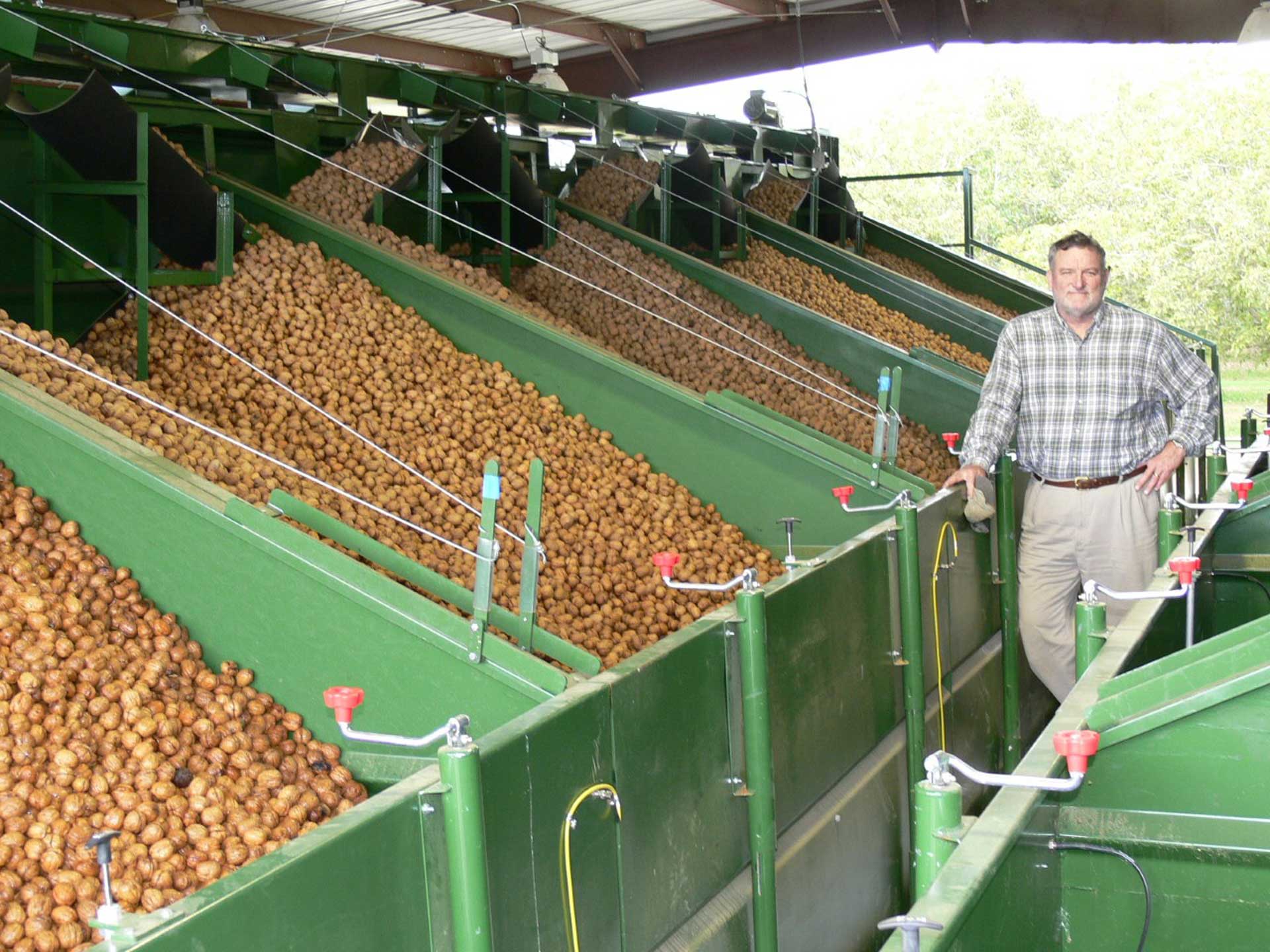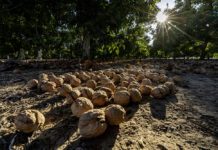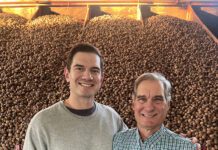
Owners of Citrona Farms LLC in Winters, Calif., Dan and Sarah Hrdy have been growing walnuts for almost 35 years. During this time, their operation has grown alongside the rest of the walnut industry and has been the subject of a series of University of California research projects focused on sustainable agriculture, habitat restoration and wildlife conservation. They have also established a research fund that will enable early stage UC Cooperative Extension projects to obtain seed money.
However, growing walnuts isn’t the only thing the Hrdys have kept themselves busy with. Sarah, who grew up in Houston, Texas, is a renowned evolutionary anthropologist, elected to the National Academy of Sciences and a Professor Emerita in the Department of Anthropology at UC Davis. She and Dan met at Harvard University half a century ago in a class on fossil man.
Sarah said, “It was love at first sight. He was the only [person] with any flesh on.” Long retired, she is still hard at work writing her new book. Dan, who grew up in Fresno before earning his Ph.D. and M.D. at Harvard, is a former clinical professor of medicine (infectious diseases) at UC Davis Medical Center. While growing nuts and engaging in habitat restoration at Citrona Farms, the couple also raised three children.
Dan said that commercial agriculture was something he and Sarah had wanted to do since their days at Harvard. While practicing medicine after moving to California, Dan became involved in developing and operating nut orchards.
“I decided I was enjoying the orchard more than the medicine,” he said. “I retired a little bit early and became a full-time walnut grower.”
Research at Citrona Farms
The Hrdys’ background in academia was the inspiration for getting Citrona Farms involved in UC ANR, UC Davis and UC Berkeley research projects. Both Daniel and Sarah understood first-hand the benefits of research in their own careers and wanted to apply that same ideal to their operation and the ag industry.
“Since we’re both scientists, we both wanted to support research, find out what really works and what doesn’t work,” Dan said. “We really liked the practical nature and wide-ranging scope of the research that UC Cooperative Extension was involved with.”
The first research projects Citrona Farms hosted were in 2000 and involved studies on wild turkey ecology/genetics, loggerhead shrike ecology and walnut field margins. Since then, the operation has been involved in over 40 individual projects with University of California and other entities.
While reminiscing on past projects, Dan noted Claire Kremen’s group’s project from 2008, which focused on native and non-native pollinators and hedgerows. Kremen and her group, hailing at the time from the Department of Environmental Science, Policy and Management at UC Berkeley, were at the forefront of studying how different agricultural practices (including hedgerows) affected pollinating insects.
Also important to the Hrdys and to the walnut industry has been Rachael Long’s work at Citrona Farms. Long, a UCCE farm advisor in Yolo County, has taken part in three separate projects in 2013, 2015 and 2019 looking at walnut hedgerow systems, weeds in hedgerow and non-hedgerow crop borders, and deep impact of long-term hedgerow plantings on soil carbon and other metrics of soil health, respectively.
“The work on hedgerows has been really encouraging, and work like Louise Jackson’s on how soil can play a role in sequestering carbon is promising. Research like theirs is integral to agriculture becoming more sustainable,” Sarah said. “You know, we’re grandparents, we care about the coming generation. We won’t be here, but they will.”
Katherine Jarvis-Shean, a UCCE orchard systems advisor in Yolo County, said that Dan and Sarah’s cooperation and dedication have been integral in research over the years. Jarvis-Shean participated in a research project on Citrona Farms in 2019 that focused on post-plant nematicide trials in Chandler walnuts.
“We were out there messing with their irrigation system to apply these treatments a couple times a year,” Jarvis-Shean said. “That meant we were getting in their way at harvest and making harvest take longer. They were really great about being supportive of that and the complications that can cause, with the bigger picture in mind of improving production.”
Dan mentioned he had always had positive experiences collaborating with researchers on their operation and Sarah emphasizes how the research “enhances their sense of place”. Key to being a good grower-cooperator with researchers Dan says is “just being open.”
![2-2-2-thumbnail_[Image+10]+SBH+Frank+Hedgerow-S](https://wcngg.com/wp-content/uploads/2022/03/2-2-2-thumbnail_Image10SBHFrankHedgerow-S.jpg)
New Endowment
After more than 20 years of research collaborations for the walnut industry, the Hrdys took it another step further and created an endowment in late 2021 that will provide as much as $100,000 per year for practical research. The endowment, called The Daniel & Sarah Hrdy Fund for UC Cooperative Extension Research, will fund early stage research projects each year for UCCE advisors and specialists as well as their academic collaborators, according to UC ANR. All UCCE advisors and specialists will be eligible, not just those related to the nut industry.
When Daniel turned 72, he was required to take the minimum required distribution from his individual retirement account. He said he and Sarah decided to use the required distribution for a charitable purpose. After Dan’s death, the corpus will fund the endowment in perpetuity.
“We were beginning to use Sarah’s required distribution for some charity anyways, and then I figured, ‘Well, instead of bits and pieces, why not make mine something substantial?’” Dan said.
Research proposals will be selected by the leaders of UC ANR’s Strategic Initiatives: Sustainable Food Systems; Endemic and Invasive Pests and Diseases; and Sustainable Natural Ecosystems. Areas of special interest include sustainable agriculture, with special regard to climate change; interaction of natural ecosystems and agriculture; habitat restoration and conservation; and wildfire and forest restoration.
The creation of the endowment also happened to coincide with UCCE’s recent farm advisor personnel expansion which, according to Dan and Jarvis-Shean, was sorely needed. Dan said that watching the cooperative extension system shrink year by year has been painful and that the new cash infusion from their fund will help the expansion as well as pay for new advisors’ research.
As the ag industry has progressed over the years, Jarvis-Shean noted there is less direct funding coming from state and government, leaving UC to rely almost entirely on grants. However, many grants require an understanding be established of why the outcome of a project will be positive, and for researchers that don’t yet have numbers from smaller projects to back this up, receiving the grant is difficult. The funds from The Daniel & Sarah Hrdy Fund for UC Cooperative Extension Research, however, don’t have as many strings attached.
Jarvis-Shean said the liberty these funds offer get cooperative extension the “resources we need to get the momentum we need to go after bigger money and solve big problems in bigger ways.”
The Hrdys hope that the endowment will inspire others within the ag industry to follow suit with similar gifts. “We want to encourage more people to do this,” Sarah said.

Taylor Chalstrom
Taylor is the new Digital Content Editor at JCS Marketing Inc., coming on to the team in June 2020 as an editorial intern. He previously attended Cal Poly, San Luis Obispo, earning a degree in Agricultural Science and a minor in Agricultural Communication. Taylor wrote for AgCircle, Cal Poly’s award-winning agriculture magazine produced by the Brock Center for Agricultural Communication, for two and a half years before becoming Brock’s Associate Editor for writing in his final year at Cal Poly.















